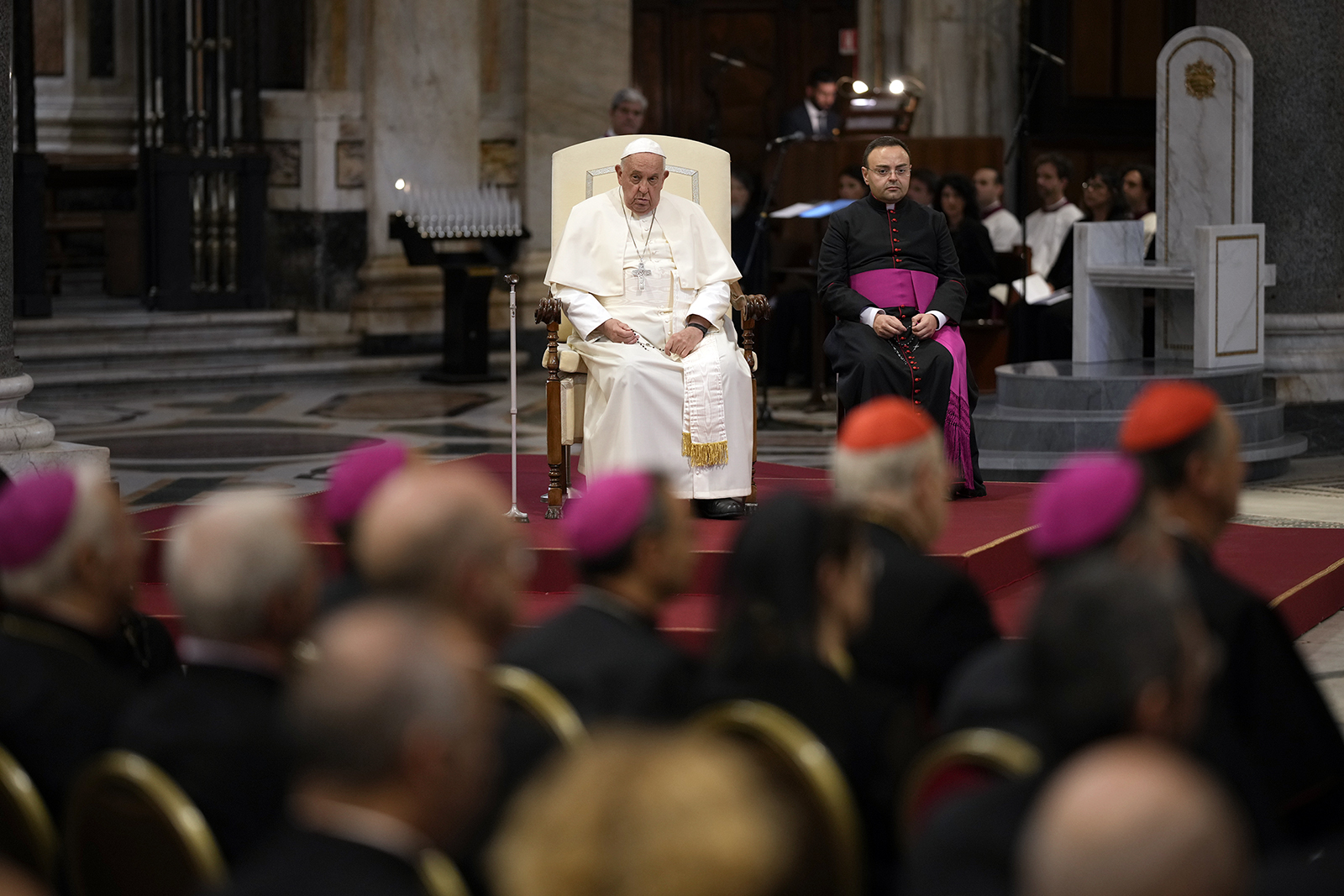
(RNS) — On the one-year anniversary of the Oct. 7, 2023, Hamas attack on Israel, Pope Francis wrote a letter to Middle Eastern Catholics, who have been severely impacted by the ongoing war. He urges that Catholics “must never tire of imploring peace from God” and calls for a day of prayer and fasting to “defeat our one true enemy: the spirit of evil that foments war, because it is ‘murderous from the beginning,’ ‘a liar and the father of lies’ ([John] 8:44).”
Given the violent rhetoric that has dominated in the public realm, Francis’ suggestion to pray for peace is refreshingly humane. Who would deny that war is an evil that everyone should oppose? However, as a Jew, I shuddered when I read these words. They triggered an instinctual terror that I have not felt since Oct. 7 itself.
Mortal fear of Catholics has been a common feature of Jewish history, but it’s actually new for me. I’m a professor at a Catholic university, where I teach biblical studies to eager Catholic students and maintain friendships with cherished Catholic colleagues. All of this is thanks to the Second Vatican Council of the 1960s, which modernized the Catholic Church and, as part of that process, renounced Catholic antisemitism — including the allegation that the Jews are eternally responsible for Jesus’ death. Pope Francis has championed Vatican II, earning him the adoration of liberals and the ire of traditionalists.
This has made the Israel-Hamas war especially complicated for Francis. He needs to balance his commitments to the Middle Eastern (including Palestinian) Catholic community and his relations with a global Jewish community that overwhelmingly supports Israel. His Oct. 7 letter reflects this balance, sticking to politically safe generalities about peace.
What triggered my fear was not the pope’s message but rather his citation of John 8:44 to articulate that message. As a Jewish Bible scholar, I know the phrases “murderous from the beginning” and “a liar and the father of lies” are not just any biblical references. Rather, they are part of arguably the single most antisemitic verse in the New Testament.
The passage, from the Gospel of John, features Jesus arguing with fellow Jews about his legitimacy — not uncommon in the Gospels. Jesus charges that they are not really descendants of Abraham, since they do not accept the truth as the patriarch would have. When the Jews demur, Jesus doubles down:
“You are from your father the devil, and you choose to do your father’s desires. He was a murderer from the beginning and does not stand in the truth because there is no truth in him. When he lies, he speaks according to his own nature, for he is a liar and the father of lies.”
In its historical context, John 8:44 is part of a disagreement between specific Jews about an internal matter. However, as Christianity developed, the verse was understood as a fundamental, eternal indictment of the entire Jewish people, by a Jesus who stood fully apart from and against them. The Jews are the children of the devil, the embodiment of evil, the enemies of humanity.
It would not be unreasonable to speculate that no individual sentence has caused more Jewish death and suffering than John 8:44. It has fueled countless persecutions, pogroms and, in its own way, the Holocaust. Most recently, it motivated the 2018 synagogue shooting in Pittsburgh, the deadliest antisemitic attack in American history.
Regardless of Pope Francis’ intentions, this is the legacy that he invoked when he chose John 8:44 to characterize “our one true enemy” on the anniversary of Oct. 7. In a war that much of the world blames on the Jewish state, citing a verse that condemns all Jews as the murderous children of the devil creates an unavoidable implication: The Jews are the reason for this horror. They are the enemies of those who seek peace — the enemies of the church and, indeed, of humanity itself.
It is impossible to overstate what a disaster this is for Jewish-Catholic relations. It recalls the most dangerous rhetoric in Catholic history and threatens the progress made since Vatican II. Although the relationship between antisemitism and criticism of Israel is famously complicated, this should be a no-brainer. If alluding to the idea that Jews are the devil is not antisemitic, then nothing is antisemitic, and there is no limit to what may be done.
Catholics committed to justice for Palestinians are, of course, entitled to oppose Israel’s military conduct. But if they care about Jews too, then the absolute least they can do is reject the use of John 8:44 in this context. Those who claim to champion the religious inclusiveness of Vatican II lose all credibility when they traffic in such language. As a Jew deeply committed to building community with Catholics, there is only one thing I can say to them — and it is, ironically, another biblical line with a long antisemitic history: Woe to you, hypocrites.
(Ethan Schwartz is assistant professor of Hebrew Bible at Villanova University. The views expressed in this commentary do not necessarily reflect those of Religion News Service.)
